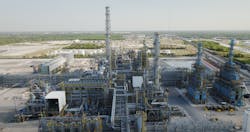ExxonMobil completes chemical expansion at Baytown complex
ExxonMobil has commissioned two new chemical production units at its 584,000-b/d integrated refining and petrochemical complex along the Houston Ship Channel in Baytown, Tex., about 25 miles east of Houston.
Entered into service on Sept. 19, the two units include a performance polymer line equipped to produce 400,000 tonnes/year (tpy) of Vistamaxx and Exact-branded polymer modifiers, as well as a linear alpha olefins unit designed to produce 350,000 tpy of Elevexx-branded products, ExxonMobil said.
The newly commissioned units complete a $2-billion investment in the Baytown chemical expansion the operator initially revealed in May 2019 (OGJ Online, May 16, 2019; May 3, 2019).
“With startup of these two new lines, ExxonMobil is delivering high-value materials for a variety of products that society depends on every day,” said Karen McKee, president of ExxonMobil Product Solutions. “We achieved excellent safety performance by leveraging our expertise to plan and execute large projects, while providing meaningful investment in the US Gulf Coast.”
Supporting more than 3,500 jobs during its pandemic-period construction to directly employ 200 people when fully operational, the project was completed on budget and according to schedule, ExxonMobil said.
Vistamaxx and Exact-branded polymer modifiers produced by one of the new units improve performance of chemical products used in manufacturing of automotive parts, construction materials, hygiene and personal care products, and various packaging applications.
Marking ExxonMobil’s entry into the linear alpha olefins market, production of Elevexx from the second new unit will be used in plastic packaging, high-performance engine and industrial oils, as well as will serve as building blocks for surfactants and drag reducing agents.
Additional Baytown plans
Completion of the Baytown chemical expansion comes as ExxonMobil advances development of a separate plan involving proposed construction of a grassroots low-carbon hydrogen production plant and carbon capture and storage (CCS) plant at the integrated manufacturing site (OGJ Online, Jan. 31, 2023).
Part of ExxonMobil’s strategy to reduce emissions from its own and local industry operations, the proposed Baytown low-carbon hydrogen, ammonia, and CCS plant would allow the site to manufacture lower-emissions products for its own customers but also make surplus volumes of hydrogen and ammonia, as well as carbon dioxide (CO2) storage capacity, available to nearby industry.
Upon first announcing the project in March 2022, ExxonMobil said use of hydrogen produced by the planned project as a fuel at the Baytown olefins plant could reduce the integrated complex’s CO2 emissions as defined by Scope 1 and Scope 2 of the Greenhouse Gas (GHG) Protocol Corporate Accounting and Reporting Standard by up to 30%, supporting the operator’s ambition to achieve net-zero GHG emissions from its operated assets by 2050.
While it does not plan to reach a final investment decision on the development until 2024, ExxonMobil has already licensed certain technologies for proposed units, as well as started discussions with third-party customers for offtake agreements from the project that, if approved, would reach startup in 2027-28 (OGJ Online, Feb. 15, 2023).
Alongside myriad finished petroleum products supplied by its refining operations, ExxonMobil’s Baytown integrated complex also produces 4 million tpy of ethylene, 700,000 tpy of polypropylene, and 600,000 tpy of paraxylene.
About the Author
Robert Brelsford
Downstream Editor
Robert Brelsford joined Oil & Gas Journal in October 2013 as downstream technology editor after 8 years as a crude oil price and news reporter on spot crude transactions at the US Gulf Coast, West Coast, Canadian, and Latin American markets. He holds a BA (2000) in English from Rice University and an MS (2003) in education and social policy from Northwestern University.

